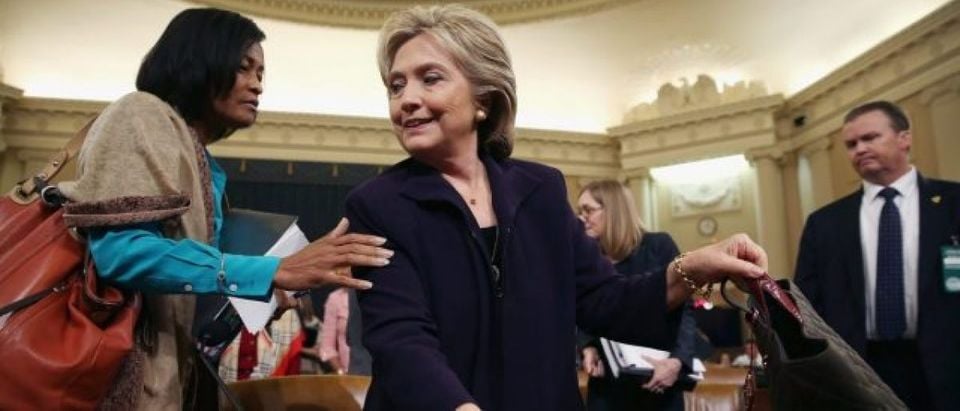CIA officials described emails found on Hillary Clinton’s private email server as “problematic” and damaging to the agency, according to summaries of interviews they gave to the FBI last May and June.
The timing of the interviews is significant because they are within a 39 day time window in which top FBI officials, including then-director James Comey, edited language in a draft memo of a statement that was to be given at the conclusion of the Clinton email probe.
A May 2, 2016 memo sent by Comey to three top bureau officials referred to Clinton’s use of a private email server to send and receive classified information as “grossly negligent.”
But according to Iowa Sen. Chuck Grassley, the chairman of the Senate Judiciary Committee, the memo was changed on or around June 10 to refer to Clinton’s actions as merely “extremely careless.”
The distinction between “grossly negligent” and “extremely careless” is significant because the former is considered a federal crime while the latter term has no legal weight.
Grassley sent a letter this week to FBI Director Christopher Wray seeking information about edits on the draft. The Republican has questioned why FBI brass appeared to decide to clear Clinton more than a month before its investigation was completed. (RELATED: Comey Accused Hillary Of ‘Gross Negligence’ In Email Case)
A review of summaries of 19 FBI interviews conducted during the 39 day window between May 2 and June 10, 2016 shows little in the way of new information that would seem to justify exonerating Clinton, a former secretary of state. And in three interviews during that period, CIA officials described emails found on Clinton’s server as “problematic” and damaging to the agency.
Comey sent his initial draft to FBI general counsel James Baker, chief of staff James Rybicki, and deputy director Andrew McCabe, The Hill reported earlier this week.
Clinton was interviewed by FBI agents on July 2, and Comey made his statement exonerating the Democrat three days later.
In his May 2 draft memo, Comey stated that “there is evidence to support a conclusion that Secretary Clinton, and others, used the private email server in a manner that was grossly negligent with respect to the handling of classified material.”
But at a July 5 press conference, Comey said that “although we did not find clear evidence that Secretary Clinton or her colleagues intended to violate laws governing the handling of classified information, there is evidence that they were extremely careless in their handling of very sensitive, highly classified information.”
Comey said that “no reasonable prosecutor” would bring a case against Clinton.
Of the 19 interviews conducted by FBI agents between May 2 and June 10, five were with employees of Platte River Networks, the Denver-based tech company that managed Clinton’s server after she left the State Department.
Agents also interviewed several Clinton aides, including former State Department advisers Cheryl Mills and Heather Samuelson. Justin Cooper, a longtime aide to Bill Clinton who helped Hillary set up her email server, was also interviewed.
Summaries of the interviews, known as 302s, were released by the FBI last year.
Four of the interviews were conducted with CIA officials at the agency’s headquarters in McLean, Va.
In a June 10 interview, a CIA official presented several emails seemingly taken from Clinton’s server. The official said that they were not bothered by two of the emails presented by FBI agents.
But upon viewing a third email, the CIA official called the person who sent it “an idiot” and referred to the contents of the document as “problematic.”
The official “expressed his opinion that [Department of State] was not very careful.”
Clinton sent or received more than 2,000 emails containing classified information. A majority were classified as confidential, the lowest classification level. But some of the documents were found to contain secret and top secret information.

Summary of June 10, 2016 FBI interview with CIA official in the Hillary Clinton email investigation. (via FBI.gov)
In a May 19 interview, a CIA official admonished the State Department for sending classified information through non-classified channels. After seemingly viewing a series of Clinton emails, the official said that State Department staff “are experienced and knew that this information was classified.”
“However, they did it anyways and their actions hurt the CIA and other agencies whose equities were conveyed in the emails.”

Summary of May 19, 2016 FBI interview with CIA official in the Hillary Clinton email investigation. (via FBI.gov)
A CIA official offered similar criticism in an interview two days earlier. After reviewing an email, the official said that “the inclusion of location, name, and time in the email was problematic.”
The official said that they “would have insisted such an email be handled in classified channels.”

Summary of May 17, 2016 FBI interview with CIA official in the Hillary Clinton email investigation. (via FBI.gov)
Grassley’s inquiry on the memo change received some pushback on Tuesday. An anonymous source told CNN’s Jake Tapper that the FBI and Comey were merely “playing with the language” of the official statement “throughout” the investigation.
But the source said that Comey and other FBI officials believed throughout “that charges would not be appropriate but that the conduct was worthy of criticism.”
“It was a matter of how to explain both,” the source, described as being familiar with the FBI probe, told CNN.
“They wanted to get a sense of what this statement might look like.”
“They hadn’t stopped investigating and they were continuing to seek access to all sorts of things from Hillary that she was fighting to have to turn over. But they also wanted internally to discuss what an end game might look like.”


